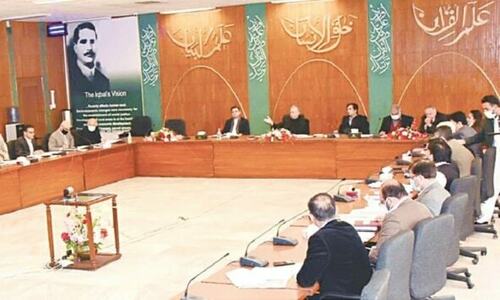ISLAMABAD: The Executive Committee of the National Economic Council (Ecnec) on Monday approved four development projects, mostly in Punjab province, involving an estimated cost of Rs448.36bn.
Three of the four programmes worth Rs322bn to be executed in Punjab.
The meeting of the Ecnec, presided over by Finance Minister Shaukat Tarin, also approved the revised Greater Karachi Water Supply Project (K-IV) at a cost of Rs126.404bn.
Planning Minister Asad Umer, Industries and Production Minister Makhdoom Khusro Bakhtiar, Adviser to the PM on Commerce Abdul Razak Dawood, Punjab Finance Minister Makhdoom Hashim Jawan Bakht, Deputy Chairman of Planning Commission Jehanzeb Khan, federal secretaries and other senior officers from federal and provincial governments took part in the meeting.
Three of the four schemes costing Rs322bn are based in Punjab
The Central Development Working Party (CDWP) had already cleared these projects on technical grounds and recommended to Ecnec their formal approval.
Under the current financial powers, the CDWP can itself approve projects costing no more than Rs10bn while projects of higher estimated costs are approved by Ecnec once the CDWP clears them on technical grounds.
The Ecnec approved Punjab Arterial Roads Improvement Programme (PARIP) at a total estimated cost of Rs129.944bn.
The project, sponsored by the Punjab government, envisages the construction of 535-km of dual carriageway highway sections between various cities in Punjab.
The PARIP is to be spread over Bahawalnagar, Bahawalpur, Layyah, Jhang, Toba Tek Singh, Vehari, Okara, Pakpattan and Sahiwal in Punjab.
The executing agency of the project is Planning and Development Board, Punjab.
About Rs14.164bn funding for the project would be arranged by the Punjab government. The Asian Development Bank (ADB) would provide Rs64.972bn while Asian Infrastructure Investment Bank (AIIB) would finance the remaining part of Rs50.808bn.
The project involves construction of 535-km section of a dual carriageway highway between various cities in Punjab.
The project would involve rehabilitation of existing carriageway as well as new construction of a second carriageway within the ‘Right of Way’ available and acquired where needed. It is meant to improve the transportation system through upgrade and dualisation of the highway network.
The scope of works includes the construction of bridges, culverts, retaining walls, drainage works, roadside facilities, and allied works.
The meeting also conditionally approved Punjab Rural Sustainable Water Supply and Sanitation Project (PRSWSSP) amounting to Rs96.202bn ($553 million) to be executed by Punjab Rural Municipal Services Company in 16 tehsils of mostly southern Punjab with directions to reduce its implementation time and carry out it initially as pilot project in some tehsils and submit its report to Ecnec for further consideration.
The project has been designed to provide basic civic amenities such as water supply, sanitation and solid waste management in rural areas of selected tehsils of Punjab.
The World Bank has already approved $442 million financing to projects to be mostly implemented in southern districts of Punjab and support vulnerable rural communities in Punjab through improved water supply and sanitation infrastructure services.
The project prioritises rural settlements, where water contamination and poor sanitation practices are more prevalent, causing high levels of illness and child stunting.
The World Bank expects the project to help more than six million rural residents in the poorest districts of Punjab to reduce child stunting and address areas at high risk to droughts and water scarcity.
Ecnec also approved Kharian-Rawalpindi Motorway project to be executed on build-operate-transfer (BOT) basis under Public-Private Partnership (PPP) mode at a total cost of Rs95.81bn.
The project envisages construction of 4-lane access-controlled 117.20-km in length motorway from Kharian to Rawalpindi.
Ecnec also approved Greater Karachi Bulk Water Supply Scheme K-IV, 260 MGD Phase –I at a revised cost of Rs126.405bn.
Initially, the project was approved with original capacity of 260 MGD in 2014 to be executed by Karachi Water and Sewerage Board and the government of Sindh.
Later, the project was revised and included in Karachi Transportation Plan (KTP) with the same 260 MGD capacity but change of sponsoring and executing agencies from Government of Sindh to the Ministry of Water Resources and WAPDA in 2021.
The project aims to meet growing water demand of Karachi and provide dependable and sustainable water transmission system from its more than 100-km away source of Keenjhar Lake to feed Karachi water supply and distribution network.
Published in Dawn, February 1st, 2022












































